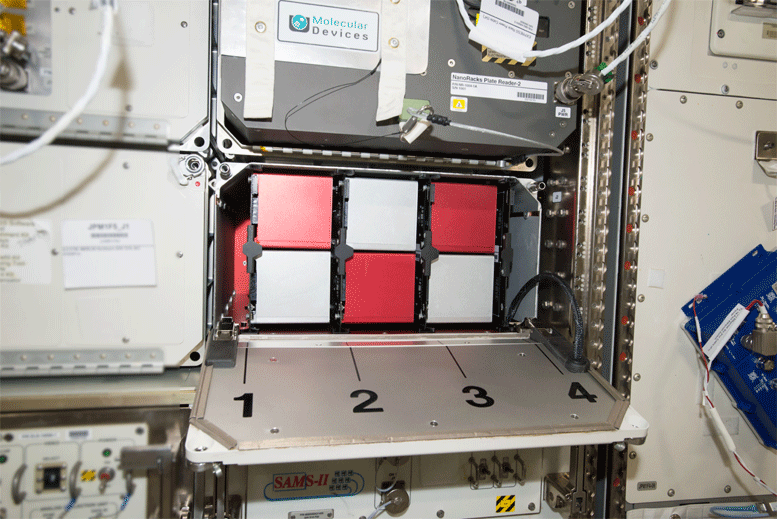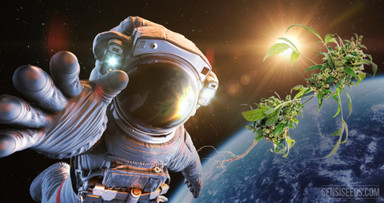Posted by David Carpenter for Forbes on Oct 7th 2018
Cannabis In Space, It's Just Around The Corner
 Module attached to NASA's International Space Station. Photo by: Getty Images.
Module attached to NASA's International Space Station. Photo by: Getty Images.
As legal marijuana profits continue to reach stratospheric heights, it appears so too may the cannabis plant itself expand into space — soaring 250 miles above Earth within NASA’s International Space Station (ISS).
With plans to test how hemp plants react in the low-gravity setting of space orbit, scientists at bioengineering company Space Tango — specializing in research and manufacturing of microgravity environments — are eager to test the cannabis plant’s response to novel environs like spaceflight. Orbiting Earth in the stress-free atmosphere of space might just provide the pharmacological outcomes scientists are looking for.
“When we send plants to the International Space Station, we eliminate one core, constant force, to which plants are well-adapted — gravity,” explained Dr. Joe Chappell, a member of the Space Tango Science Advisory Team, who is a specialist in drug development and design and has assisted with previous ISS experiments. “When plants are ‘stressed,’ they pull from a genetic reservoir to produce compounds that allow them to adapt and survive.”
Cannabidiol is the primary component that Chappell is talking about — and just one of the over 100 known cannabinoids present in cannabis. A current star therapeutic compound of the plant (referred to as CBD and non-psychoactive, so it does not produce the high of marijuana), it has gained widespread popularity over the past few years and proven to be a curative agent for a host of physical maladies. Its most impressive characteristic has been its ability to minimize severe seizures in epilepsy patients. A significant driver in the development of cannabis as medicine, the recently elevated status of CBD was further cemented this year with the approval of the CBD-based medication Epidiolex by both the Drug Enforcement Administration and the Food and Drug Administration. An unprecedented move by the two august bodies, as cannabis in general remains a Schedule 1 drug (alongside heroin and LSD) and therefore illegal at the federal level in the U.S.

Space Tango's CubeLab modules employed at NASA’s International Space Station.COURTESY OF SPACE TANGO
Space Tango’s strategy to conduct tests on hemp plants rather than marijuana plants has to do with hemp’s federal designation as containing less than .03 percent of THC, the high-inducing compound in cannabis. At that amount there is no psychoactive effect at all — unlike marijuana, which is perceived as a drug of abuse. Impetus for Space Tango’s move also comes on the heels of U.S. Senate Majority Leader Mitch McConnell’s (R-KY) efforts to legalize hemp at the federal level with this year’s Farm Bill, which includes the Hemp Farming Act of 2018. Hemp advocates believe that it’s just a matter of time before the Schedule 1 shackles are removed from cannabis, which will then allow pharmaceutical interests to freely research and develop new medicines from those 100-plus potentially curative cannabinoids.
NASA is no stranger to cultivating plants in space. The Vegetable Production System — nicknamed “Veggie” — is a plant growth module that was launched in 2014 and produces eatable greens “to provide the crew with a palatable, nutritious, and safe source of fresh food and a tool to support relaxation and recreation,” says NASA. “Veggie is also used for fundamental space biology experiments such as the series Advanced Plant Experiments and educational space biology activities.”
Riding the wave of new biological experiments on the ISS, Space Tango has created modules called CubeLabs, which are fully automated lab systems allowing multiple payloads to run independently while orbiting the Earth. Their lab facilities provide interactive management via Earth and the ability to download images and data in near real-time from the station. With a proven track record conducting agricultural experiments in space, in 2017 Space Tango worked with the Anheuser-Busch Company on a project testing barley seeds in the stress-free atmosphere of space orbit. That data has provided key findings regarding seed exposure and seed germination.
Teaming up with Kentucky-based Atalo Holdings — an ag-tech company that will provide certified hemp seed and expertise to the venture — the hope is to study the development of certain promising hemp strains in the absence of gravitational pressures. Online retailer Anavii Market, a source for hemp-derived CBD therapeutics, will also join the collaboration slated to launch February 2019.
“Understanding how plants react in an environment where the traditional stress of gravity is removed can provide new insights into how adaptations come about and how researchers might take advantage of such changes for the discovery of new characteristics, traits, biomedical applications and efficacy,” said Chappell.
Space Tango's upcoming research may provide yet another positive step in the evolution of cannabis as medicine, and the unleashing of the cannabis plant into free markets.

